As a Black American Who Had Never Been On Safari, I Had Doubts — but a Trip to Zambia Changed My Mind
On a safari through Zambia, I discovered not only incredible wildlife and landscapes, but passionate individuals creating change.
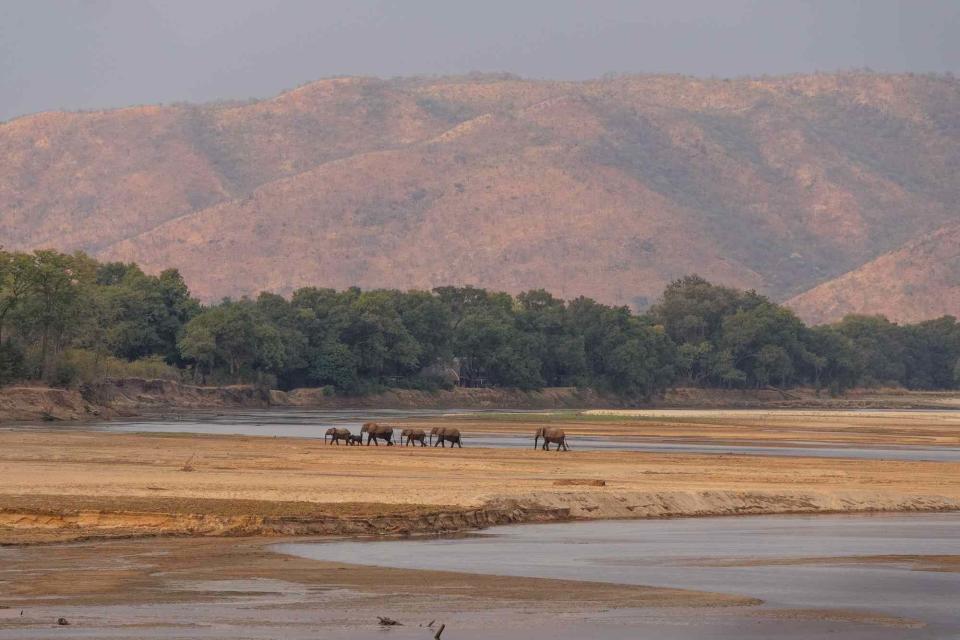
Khadija Farah
A herd of elephants in Zambia's South Luangwa National Park, as seen on safari with the Bushcamp Company.As a Black American, I’ve always been fascinated by the continent of Africa. I sometimes gaze at a map or a globe, studying the imposing landmass with its broad shoulders and tapered tip, wondering which country my ancestors came from. Perhaps this is why my interest in Africa has always been more about people, rather than animals. How, then, did I find myself exploring the national parks of Zambia outfitted in khaki, binoculars and camera in hand, reveling in the majesty of its flora and fauna?
Well, after two years of pandemic confinement, the outdoors beckoned like never before. Being out in the wild promised an experience antithetical to my urban American existence, where the only animals I encounter are the brazen chipmunks that plunder my tiny Atlanta garden. If there was one thing the past few years gave me, it was a renewed desire to join the world, and to see it all.
And yet, I wasn’t sure what to expect of Zambia. Magazine articles, Hollywood movies, and even the Instagram posts of fancy friends tended to focus on the sumptuousness of resorts in Kenya and South Africa, and honestly, they didn’t appeal to me. I’m the sort of traveler who appreciates comfort — but I’m not into fussiness, and I don’t like being fawned over.
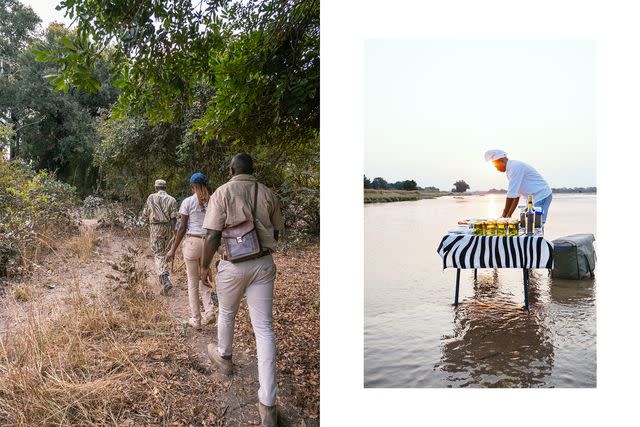
Khadija Farah
From left: Setting off through the bush on a nature walk at Mfuwe, a Bushcamp Company lodge in South Luangwa; at Kapamba, sundowners are served midstream in the Luangwa River.Happily for me, my trip was planned by Cherri Briggs, founder of the safari operator Explore, Inc. A longtime Zambia resident, passionate conservationist, and committed bon vivant, Briggs doesn’t just book a safari. She choreographs an adventure. At her recommendation, my first stop was with the Bushcamp Company, which runs lodges that strike the perfect balance between relaxed luxury, civic engagement, and serious game tourism. One fellow traveler described Bushcamp as “hard-core,” explaining that, on safaris elsewhere in Africa, her guides had used drones and GPS tracking devices to locate the animals, then driven her and the other guests to see them, as if satisfying an appointment. “I prefer authentic safaris,” she said.
“Come with me,” said Andy Hogg, minutes after I arrived at Mfuwe, one of the nine properties his company operates in Zambia’s South Luangwa National Park. With his sun-chapped face and rugged boots, Hogg, who is the Bushcamp Company’s founder and director, looked every bit the naturalist. “There’s something exciting waiting for you.”
Related: How Safari Innovators Are Rethinking the Classic Trip
That “something” was a pair of elephants, affectionately referred to as “ellies” by the folks at the lodge. Mother and baby wandered the grounds munching foliage, while all the humans — workers and guests alike — looked on with delight, cooing as the little one struggled to climb onto a raised walkway. It took several adorable attempts, but he finally heaved his body up onto the path, to the cheers of everyone watching. I could have sworn he saluted us with his trunk before trotting ahead to join his mother.
Elephants are hardly unusual within South Luangwa; other than impalas, they were the animals I sighted most frequently on my trip. Yet each encounter felt like a miracle, and none was more enchanting than this pachyderm welcoming party. The safari portion of my trip had begun.
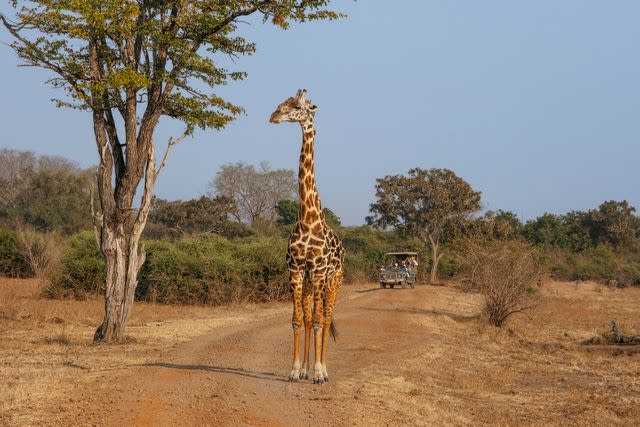
Khadija Farah
Giraffe-spotting in South Luangwa National Park.The Bushcamp Company operates three lodges and six camps. I began at Mfuwe, which I nicknamed “The Mothership.” It sits on the banks of two lagoons that attract a vast array of animals, especially in the dry season. After checking in to my cabana, I sat by my private plunge pool, intending to thumb through a magazine. But the words and images on the pages could not compete with the parade of creatures only yards away. Without needing binoculars, I watched a pair of zebras drink from the lagoon as herons, saddle-billed storks, and fish eagles kept watch.
Before heading out on my first game drive, I was introduced to the trio of Bushcampers who would make up my wildlife expedition team. Fannuel Banda, the lead guide, was born and raised in the town of Mfuwe, just a few miles away. He was a nature lover before he even knew there was such a term; as a child, he refused to join the other boys who, for sport, threw stones at birds. “I must have been thirteen at the time,” he recalled. “I wanted to handle the birds, see them in more detail.”
The camp photographer, Aaron Mwale, is a native of Lusaka, the Zambian capital. He wore the drab colors requisite for a safari, but his clothes were fitted, pressed, and finished off with stylish sneakers — a city slicker in the bush. He arrived in Mfuwe with the ambition of becoming a chef, but instead discovered a passion for nature photography. Wildlife tracker Gwen Mukumbi, soft-spoken and intense, aspires to be the first woman guide at the Bushcamp Company; Banda, whose mother passed away after acing the guide exam, has made it his mission to train her.
"“I have seen a black rhino only once,” Banda said. “I was a boy and my grandmother called me outside. I ran to the door and saw him disappearing into the bush.” His face betrayed complicated emotions as he simultaneously remembered the profundity of the moment and contemplated the near extinction of the species. "
On our first ride that afternoon, we drove slowly, keeping our eyes peeled. Periodically, Banda opened the door of the jeep to decipher animal prints or dung, furrowing his brow like an archaeologist studying hieroglyphs. “Very interesting,” he would mutter. The sun began to sink, and Banda steered the jeep to the east. “I have a good feeling,” he said as he parked near the base of a bridge. I nibbled on dried mango as we observed a troop of baboons chattering among themselves. As their volume increased, Banda gave a triumphant smile. “There,” he exclaimed, pointing. “Leopard!”
I don’t know who was more excited — me, the newbie spotting such an iconic creature on her first game drive, or Banda, who had followed his hunch and was so richly rewarded. Once the leopard disappeared into the bush, the baboons returned and the four of us laughingly tried to imagine the meaning of their chatter, which sounded boastful now that the danger had passed.
The next day, we headed off on a four-hour game drive en route to Chindeni, another Bushcamp property, crisscrossing South Luangwa National Park as we went. In addition to the abundant wildlife, the park’s vegetation is miraculous. Sausage trees, named for the cylindrical fruits drooping from their branches, seemed to be everywhere we looked. But the baobab trees are the real signature of this landscape. Standing up to 100 feet tall, their leafless branches cut striking figures against the deep blue sky. We passed one that resembled a man waving his arms in excitement; another seemed to be perfecting a yoga pose. The base of each had been scarred by hungry elephants, who crave the nutrients in the baobabs’ bark. Somehow, the complexity of this ecosystem resurrected the science nerd inside me.
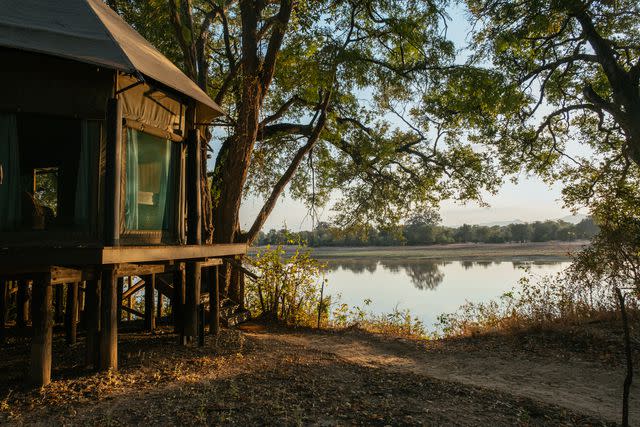
Khadija Farah
The Bushcamp Company's Chindeni camp.“But they don’t have leaves for eight months of the year. How do they conduct photosynthesis?”
Banda handed my question off to Mukumbi, his protégé, simultaneously testing her and giving her an opportunity to shine. “Photosynthesis occurs on the bark,” Mukumbi explained, scraping the trunk of a nearby tree to reveal spongy green flesh. Banda collected a couple of large pods that had fallen from the tree and shook out a few seeds. He popped one into his mouth and the rest of us followed suit. Savoring the tart flavor, we went on our way.
In the safari world, there is much talk of the Big Five — the elephant, buffalo, leopard, lion, and rhino that make up the must-see goals for most visitors to Africa. After four days at Mfuwe, I had seen four out of five. Only the rhino was missing.
“I have seen a black rhino only once,” Banda said. “I was a boy and my grandmother called me outside. I ran to the door and saw him disappearing into the bush.” His face betrayed complicated emotions as he simultaneously remembered the profundity of the moment and contemplated the near extinction of the species.
Then he motioned that I should pick up my binoculars. “The lilac-breasted roller!” I caught the brilliant bird in my sights just in time to observe its spiraling courtship dance. “He is enjoying life!”
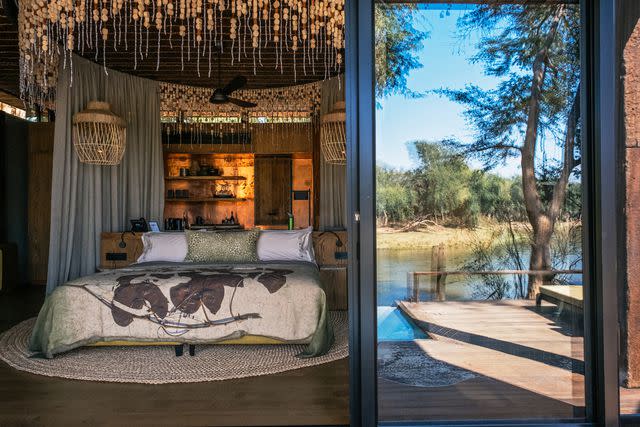
Khadija Farah
Lolebezi, on the Zambezi River, is one of Zambia's newest—and most luxurious—safari lodges.It was hard not to enjoy life with the Bushcamp crew. Although the company’s lodges eschew the elegant, colonial-style décor you might expect of a property in Kenya or South Africa, they are extremely comfortable, the guest rooms outfitted with plush linens and luxe bath products. In the morning, in lieu of an alarm clock, a Bushcamper sang “good morning” outside my window in an opera-worthy baritone.
And though breakfast is simple — porridge, toast, and eggs — dinner each evening was worth the wait. On my final night in South Luangwa I visited KuKaya, the newest lodge in the Bushcamp family. There I was presented with an exquisite Indian feast, prepared on the spacious patio of my private villa. The chef made three curries, samosas, roti, and naan; a South African Chenin Blanc pairing elevated the meal from delicious to sublime.
Related: I Took My Family on a Bird-watching Safari in Botswana — and It Was the Trip of a Lifetime
No Bushcamp experience is complete without a visit to the farm and school campuses the company supports. Hogg showed me his playful side when he introduced me to the baby elephant at Mfuwe Lodge, but at the Bushcamp farm he revealed himself to be a man on a mission. “We grow all the food served at the camps,” he said as we toured acres of well-kept crops. Tomatoes hung from the rows of vines like Christmas ornaments. Eggplants caught the glare of the sun, shining like mirrors. Bushes of wild lavender attracted pollinators, humming and buzzing.
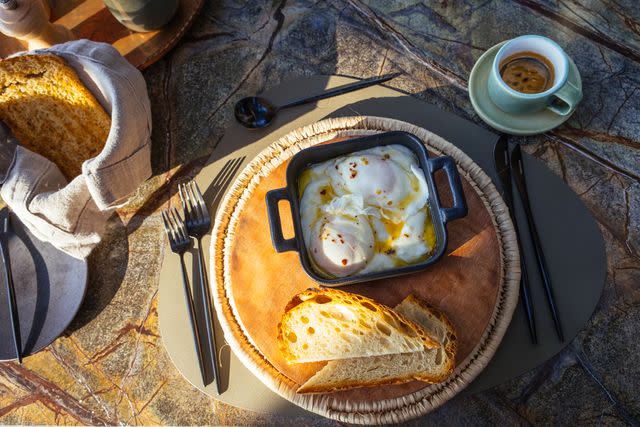
Khadija Farah
Breakfast is served at Lolebezi.Offering me a bowl of dried mango, Hogg explained that the trees in the area produce more fruit than anyone could possibly eat. As he waved his arms, I looked up at the dark green foliage overhead. “Tons,” he said. “Literal tons.” The crop falls to the ground and rots, attracting elephants, drawn to the bounty. These elephants, in turn, ravage crops and antagonize villagers — a dynamic, Hogg explained, that’s at the heart of human-wildlife conflict.
The solution: the Bushcamp Company ordered a drying contraption, allowing it to create dehydrated mango that retains the sweet tang of fresh fruit without the use of preservatives or sugars. Of the
10 tons of mangoes preserved last season, some will be offered to guests, but the majority will be tucked into the lunch boxes of local schoolchildren.
"We walked single file, enjoying the shade of acacia trees, their canopies bringing to mind iconic images of Africa."
“Would you like to see the school?” Hogg asked, gesturing toward a group of shipping containers. The containers themselves create the walls, the space inside each container provides offices for the teachers, and the outdoor areas between the containers serve as the classrooms. Such ingenuity, I was beginning to realize, is a Bushcamp Company signature.
For the record, no one in Zambia calls it the Zambezi River. You always say “The Mighty Zambezi.” On the banks of this powerful waterway, in Lower Zambezi National Park, is Lolebezi, a lodge that opened in June 2022, weeks before my visit.
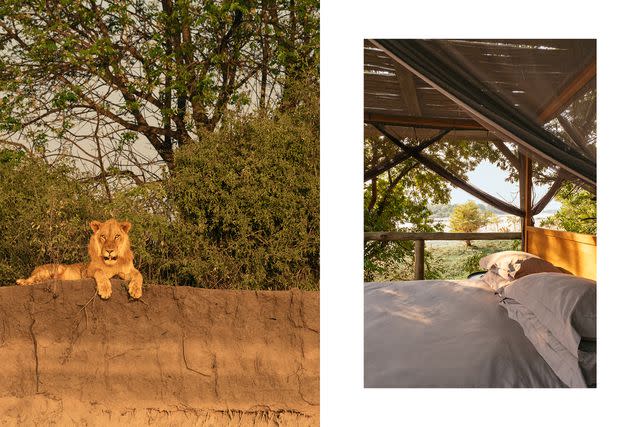
Khadija Farah
From left: A lion taking a break on the banks of the Zambezi, as seen on a sunset boat tour; a guest tent at Kapamba, one of the Bushcamp Company's nine properties in Zambia.I was not surprised to discover that the owner hails from Dubai — the property, like the lavish hotels in the United Arab Emirates, gives you a sense that someone has anticipated your every need. My bathroom, which was just as large as the rest of my suite, had a deep tub and rain showers both indoors and out. The dinner menu skews fine-dining, with dishes like whipped-feta salad, braised lamb shank, and petit fours arranged on a cake stand. But despite the many accoutrements, the vibe is warm and approachable.
Lolebezi is the newest lodge from African Bush Camps, which was founded by Bekezela Ndlovu, one of the very few Black Africans in a leadership role in the safari industry. Beks, as he is widely known, is Zimbabwean by birth — though nationality is not a concept he’s unduly attached to. The evening after I arrived at Lolebezi, as he and I cruised down the mighty Zambezi sipping small-batch whiskey, a pair of elephants made their way from the Zimbabwe side of the river, cutting across the current without churning the water or disturbing our boat. “You see these elephants? They don’t care what side of the river is which country,” Beks said. “What they know is that this is the world.”
More Trip Ideas: 5 Amazing Black-owned Travel Companies to Know and Support
Although he is now something of a celebrity in hospitality circles, Beks got his start as a humble safari guide. On my final day at Lolebezi, he insisted on guiding my morning game drive. Zambia, he explained, is the birthplace of the “walking safari” — a concept pioneered by British conservationist Norman Carr in the 1950s and since adopted by lodges across the country. So it felt only right when, having driven deep into the park after sunrise, Beks, three other Lolebezi guests, and I disembarked from our jeep and prepared to explore the bush on foot. We walked single file, enjoying the shade of acacia trees, their canopies bringing to mind iconic images of Africa. However, many of the trees, stripped of their bark by elephants, have withered in the fields. This is the consequence of the surge in elephant numbers, a result of crackdowns on hunting and poaching over the past decade. “In ten years,” Beks predicted, “this entire forest will be gone.”
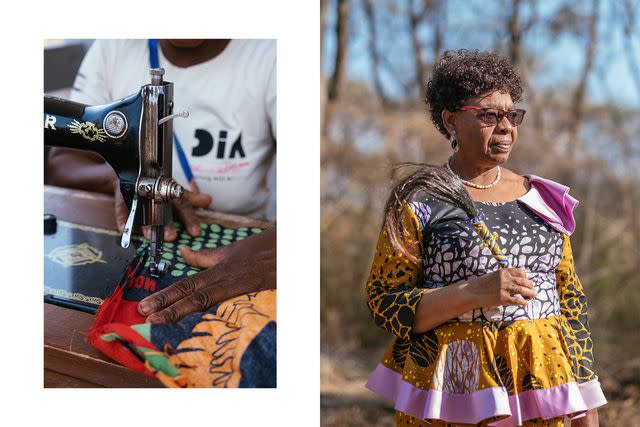
Khadija Farah
From left: Village women attend a Direct Impact Africa sewing class in Chiawa; Chieftainess Chiawa, the head of a tribal community near the Kiambi Safaris lodge.But on that morning, the park’s open vistas allowed for herds of buffalo to gather unimpeded as kudu looked on, preening and showing off their spiral horns. Baboons wrestled and chased vervet monkeys, oblivious to the small band of humans in their midst who were enraptured by the splendor of it all. The grass underneath our boots snapped as we walked carefully in one another’s footsteps. At the head of the line, Beks scanned the bush in every direction. Then, in a hushed voice, he said “Lion,” and pointed to the east. I followed his fingers to where three males clustered at the base of an acacia tree, less than 50 feet away. Two were sleeping, sprawled like giant house cats, but a third sat up and watched us through narrowed eyes.
“I promised you a lion,” Beks said, flashing a brilliant smile. “And I have given you three.”
The journey from Lolebezi to Kiambi, my final stop, required a boat ride down the Zambezi: a busy thoroughfare, thick with everything from canoes to sleek motorboats. Along the banks, massive crocodiles kept watch.
The location of the Kiambi Safaris lodge, at the top of a scenic bluff, required that I climb several flights of stairs after disembarking from my motorboat. A lodge worker sprinted up the stairs with my luggage as I followed behind at a more leisurely pace, hoping that no one noticed my labored breathing. At the top of the climb were a group of thoughtfully placed campaign chairs. Immediately, I plopped down and accepted the gin and tonic proffered by Janine Bianca Woods, Kiambi’s general manager.
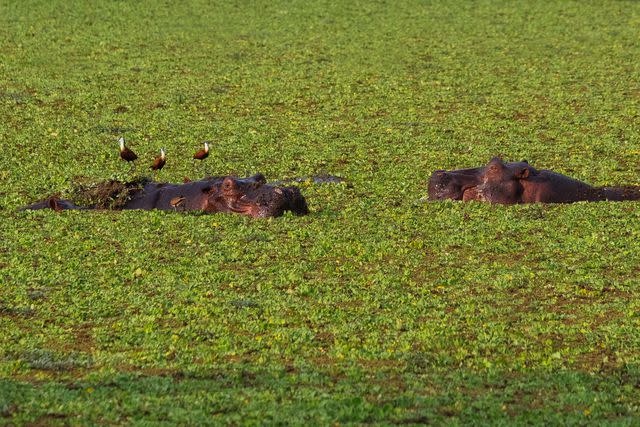
Khadija Farah
Hippos cool off in a lagoon in South Luangwa.As I caught my breath, she informed me that southern Africa is home to a burgeoning craft gin industry. (For the record, the gin infused with marula fruit produced by the African Craft distillery is my new favorite spirit.) With short curly hair, elaborate tattoos, and gauged ears, Woods is the sort of person who would be at home anywhere, just as long as that location isn’t in any way pretentious.
“It’s a tradition, you know, drinking beer on the river,” Woods told me. I didn’t know, but I played along. The can of beer erupted as I opened it, soaking the front of my silk dress — the only nice outfit I had packed for this trip. We were on our way to meet Her Royal Highness Chieftainess Chiawa, leader of the Goba tribe, a community located on the banks of the Zambezi. Chiawa made headlines in 2015 when she insisted that her people be treated as true Zambians — despite the fact that her tribe speaks a Bantu language very similar to the one spoken in neighboring Zimbabwe.
As we waited in a thatched hut for Chiawa to receive us, Woods gave me a crash course in etiquette. “Like this,” she said, showing me how to greet the chieftainess by kneeling and clapping. Chickens pecked at the dirt floor as I did my best to follow along. Woods frowned at my efforts: “You should cup your hands,” she said. “Let’s try again.”
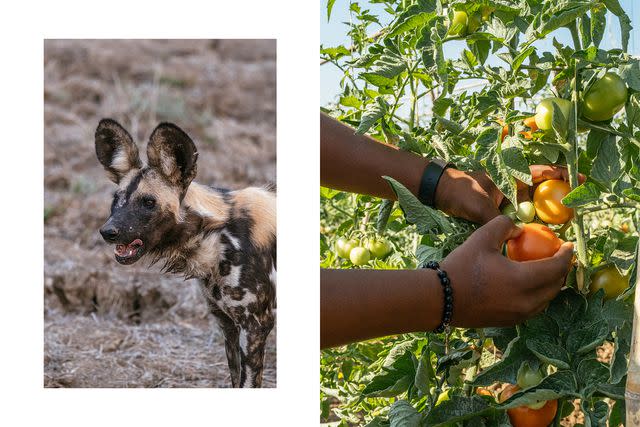
Khadija Farah
From left: A wild dog in Lower Zambezi National Park licks its lips after a hunt; tomatoes grown at the Bushcamp Company's garden at Mfuwe.Finally, we were beckoned to another thatched hut. When the chieftainess entered I fell to my knees, just as I had been taught, honored and humbled to be in the presence of a queen. I had been expecting, if not a crown and scepter, at least a ceremonial robe of some sort. But it turns out queens are human, just like the rest of us, and Chieftainess Chiawa had been relaxing at home in a simple dress and comfortable shoes when I came calling.
Learning that I was on a tour of the safari lodges of Zambia, Chiawa was clearly pleased. Tourism has greatly improved life for the families of the country, she said, gesturing to the road connecting her village to the marketplace, which was funded by Explore, Inc.’s charity, Direct Impact Africa. Before this road was built, young women would travel days on foot to market to purchase the cornmeal for nshima, the Zambian staple food. “You cannot underestimate the consequence this has had on Zambian people’s lives,” she told me.
"It turns out queens are human, just like the rest of us, and Chieftainess Chiawa had been relaxing at home in a simple dress and comfortable shoes when I came calling. "
While in Chiawa, we visited several farms that operate as women’s cooperatives, where villagers cultivate fruits and vegetables to sustain their families and supply market stalls. A poultry outfit operates under the cheeky banner “Chics for Chicks.” At Simbarashe Woman’s Co-Op we were treated to a children’s dance performance. Afterward, the tweens who study at the center read aloud from chapter books while the younger girls gazed on with admiration.
The enthusiasm of the children fed my soul, but in the weary eyes of their mothers I could see how much more work there was to be done. Earlier in the day I visited a farm operated by a dozen or so women. Their planting field was protected by electric fencing and watered by an irrigation system. As they showed me their crops, I noticed acres of land, barren and uncultivated, around their field. To grow their enterprise, they would need more fencing, solar panels, and irrigation equipment. All these things require money, of which there is precious little.
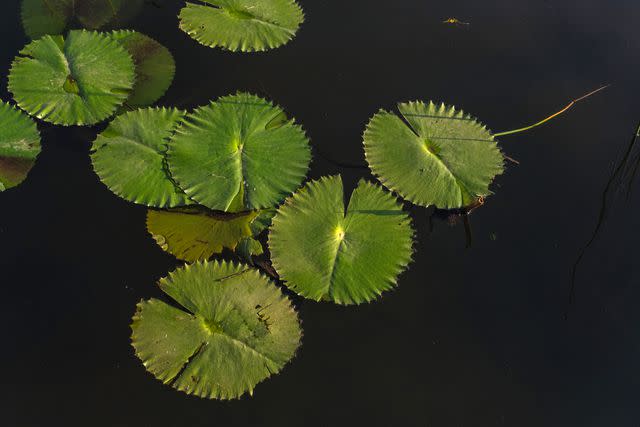
Khadija Farah
Water lilies on the Zambezi river.If there was a balm for my troubled mind, it was the buoyant atmosphere back at the Kiambi Safaris lodge. Although it is located just down the river from Lolebezi, the two properties could not be more different. Where Lolebezi offers yoga classes and espresso drinks on demand, Kiambi feels unfussy, rustic, and folksy, with clean, spare rooms that brought to mind dormitory living and plated dinners that were hearty and comforting.
“Safari has always been seen as expensive, but this does not have to be the case,” Woods said. Kiambi offers everything from a full-service plan that includes meals and game drives to a camping plan starting at $16. “Kiambi has always been a product that is accessible to the people.” In the middle of our conversation, Woods excused herself to take a call on her cell phone. “Yes, Your Highness,” she said. “Of course.” Then she rushed to the kitchen, giving urgent instructions.
At dinner that evening, I noticed a Zambian family laughing among themselves. As a waiter passed, he stopped in his tracks. I squinted, then gasped. There, seated at the back of the dining room, was the chieftainess and her extended family. Still balancing his tray, the waiter fell to his knees and performed the ceremonial clap one-handed, tapping his thigh. I wasn’t sure if I should make my way to her table. Does one intrude upon a chieftainess as she dines? Then, to my surprise, she made the first move. I hopped up and performed the ceremonial kneel-and-clap. The chieftainess smiled at me, the way one smiles at a child who awkwardly attempts a complicated adult task.
“Are you enjoying your visit?”
“Yes, ma’am,” I said, slipping into my Southern manners. (I would later kick myself for not saying “Yes, Your Highness.”)
After dinner I went outside and sat in a sturdy wooden chair. Woods, relaxing with a South African Pinotage, sat beside me. When I admired my chair, Woods told me that it was made by a staffer at the lodge who has a talent for woodworking. Kiambi Safaris has sponsored employees as they earn degrees in hospitality; another is studying for an accounting qualification. “We decided that we needed to start developing our staff,” Woods explained. “My view was that we are a proudly Zambian lodge and we want to be proudly Zambian with our workforce.”
Related: 10 Mistakes to Avoid on Safari, According to Experts
Staring into the fire under a sky crowded with stars, I listened to the roar of the Zambezi. Woods regaled me with stories about wildlife — including a sweet yarn about Jackie, a baby hippo she raised herself. But she spoke even more fondly of her colleagues, the unique cadre of men and women who do the essential work of helping visitors like me find a way into the natural world.
Over 10 days in the African wilderness, Woods and others like her had shown me the folly of my resistance to ecotourism. Flipping through the photos on my phone en route to the airport the next day, I took in the faces of all the people I’d met: farmers, entrepreneurs, guides, even a queen. The land, the wildlife, the roaring river — this beautiful world, and everyone in it, was Zambia.
Where to Stay
The Bushcamp Company: Each of its six camps and three lodges in South Luangwa National Park has a chic yet understated feel. At Mfuwe Lodge, elephants walk through the open-walled lobby.
Kiambi Safaris: A relaxed, family-friendly property located at the confluence of the Lower Zambezi and Kafue rivers. Accommodation ranges from air-conditioned chalets to camping packages.
Latitude 15°: Twenty minutes from the center of Lusaka, the Zambian capital, this design-forward hotel works with local communities to create statement interiors from upcycled and sustainable materials.
Lolebezi: On the banks of the Zambezi River, the latest lodge from African Bush Camps — founded by Bekezela Ndlovu, one of the first Black Africans in a leading safari-industry role — has eight luxe suites with private plunge pools.
How to Book
Explore, Inc.: This safari outfitter — founded and owned by T+L A-List travel advisor Cherri Briggs — arranges custom trips throughout the country, including South Luangwa National Park and the Lower Zambezi. Explore Inc. can also arrange visits to women’s cooperatives and other social enterprises.
A version of this story first appeared in the July 2023 issue of Travel + Leisure under the headline "Back to the Source."
For more Travel & Leisure news, make sure to sign up for our newsletter!
Read the original article on Travel & Leisure.

